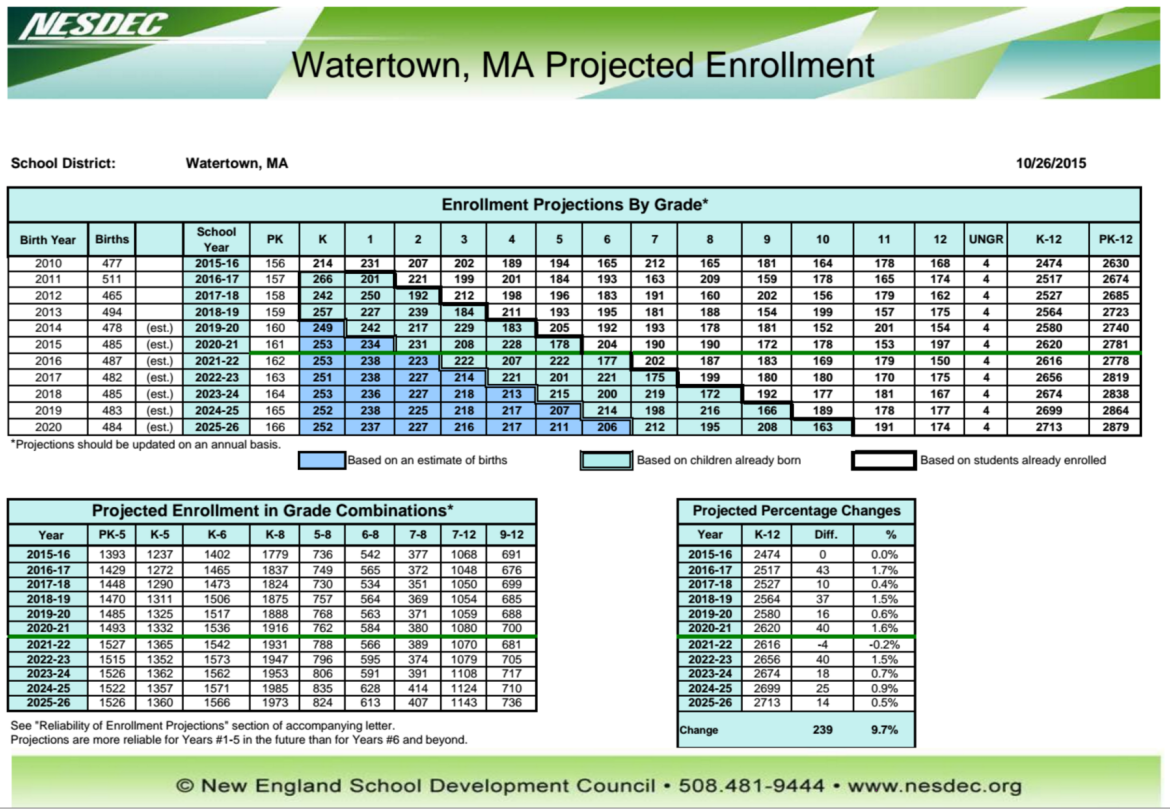
Watertown’s schools could grow twice as fast in the next decade as it did the previous 10 years, with new enrollment projections anticipating more than 200 coming to town schools by 2025.
On Tuesday night the School Committee heard from John M. Kennedy from the New England School Development Council (NESDEC), who provided some historical data and looked to the future.
Over the last 10 years, enrollment has risen quite steadily, Kennedy said, from 2,377 for grades K-12 in 2005-06 to 2,474 in 2015-16, or an average of nearly 10 a year. He noted there have been some blips along the way, including dropping by 138 students in 2014-15 and adding back 43 in 2015-16.
Kennedy looked at future enrollment, and used births, the number of building permits issued for housing and the demand for housing to make his projections.
“The increase total (over the next 10 years) is 239 students,” Kennedy said. “That is significant – an average of 23 or 24 a year.”
The breakdown of the added enrollment is 123 more in the elementary schools (grades K-5), 88 at Watertown Middle School (5-8) and 45 at Watertown High School (9-12) by the 2025-26 school year.
John Portz, who was elected School Committee Chairman at the meeting, said he is curious to know if there are bubbles at the elementary level that would require the addition of a new class and teacher just for one year, and then the bubble would move to the next grade the following year.
School Committee member Eileen Hsu-Balzer said the projections are a mixed blessing
“The good news is we are desirable and people want to put their kids in our schools,” Hsu-Balzer said.
Kennedy confirmed what many have said, that Watertown is a hot town for real estate. He noted that the median single family home price rose from $440,000 in 2011 to $560,000 in 2015. Communities farther from Boston have not seen the same increase, he said.
Another change is what different generations are looking for. He said the Millennials, those born between 1982 and 2004, are more likely to want a city-living lifestyle than previous generations. That means that they may want to raise a family in a three- or even two-bedroom apartment or condo.
On top of that, the Baby Boomers are downsizing, and when they leave their homes with multiple bedrooms they will most likely be filled by families with children.
Most of the apartments that have been built in recent years in Watertown have been one- and two-bedrooms, said Lauren Harwood, the district’s Accountability Data Manager.
Kennedy warned that his numbers are just projections.
“Any projection is only that. There are no guarantees,” Kennedy said. “The first six years are based on children who are in school or have been born already. After that they are based on projected births.”
